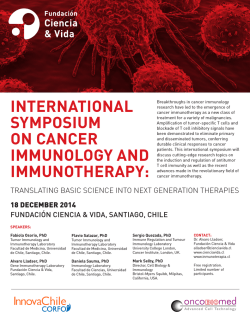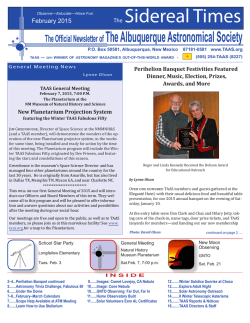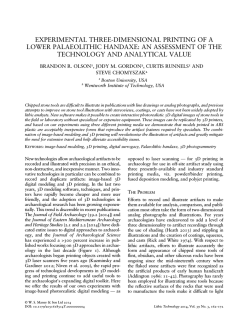
TAAS - VII TAAS San Felipe, Chile
FIRST ANNOUNCEMENT 7th Meeting of Archaeological Theory in South America (TAAS) San Felipe, 6-10 October 2014 Sociedad Chilena de Arqueología Departamento de Antropología, Universidad de Tarapacá Departamento de Antropología, Universidad de Chile Dirección Museológica, Universidad Austral de Chile Departamento de Antropología, Universidad Alberto Hurtado CALL FOR PROPOSALS Dear colleagues, the Sociedad Chilena de Arqueología and sponsoring Universities, invite you to participate in the 7th Meeting of Archaeological Theory in South America to be held in the town of San Felipe, Valparaíso region, Chile, from 6th to 10th October 2014. The TAAS (Teoría Arqueológica en América del Sur) was born from the desire and need to discuss the specific situation of Latin American archaeologies and its place in global theoretical paradigms. The idea began to take shape in 1996 in Argentina, bringing together people from universities such as Catamarca, Campinas and Sao Paulo, with the support of the World Archaeological Congress (WAC). The first meeting was held in 1998 in Vitoria Espirito Santo, and then repeated in Olavarría (2000), Bogotá (2002), Catamarca (2007), Caracas (2010) and Goiania (2012). The 7th TAAS in San Felipe (Chile) will be the first time this event will take place on the Pacific coast of the continent. The 7th TAAS organization will be led by academics from Universidad de Tarapacá (Arica), Universidad de Chile (Santiago), Universidad Austral de Chile (Valdivia), Universidad Alberto Hurtado (Santiago), and Sociedad Chilena de Arqueología. The chosen location for the 7th TAAS is the Centro Cultural El Almendral in San Felipe, Valparaiso region, a former convent declared National Monument, located in a typical area of the central valley of Chile, about halfway between the Pacific Ocean and the Andes Mountains, along the Aconcagua River. The location is housed in a rural area which encourages reflection. ORGANIZING COMMITTEE Academic and Scientific Committee -Alejandro Haber, Universidad Nacional de Catamarca, Argentina. -Andrés Zarankin, Universidad Federal de Minas Gerais, Brasil. -Carlos López, Universidad Tecnológica de Pereira, Colombia. -Cristóbal Gnecco, Universidad del Cauca, Colombia. -Eduardo Góes Neves, Universidad de Sao Paulo, Brasil. -Gustavo Politis, Universidad Nacional del Centro de la Provincia de Buenos Aires, Argentina. -Henry Tantaleán, Universidad Nacional Mayor de San Marcos/Instituto Francés de Estudios Andinos, Lima. -José Roberto Pellini, Centro Académico de Arqueología de la PUC Goiás, Brasil. -Julio Cezar Rubin, Centro Académico de Arqueología de la PUC Goiás, Brasil. -Marcia Bezerra, Universidad Federal do Pará, Brasil. -Pedro Funari, Universidad de Campinas, Brasil -Rodrigo Navarrete, Universidad Central de Venezuela, Venezuela. Executive Committee - Andrés Troncoso, Departamento de Antropología, Universidad de Chile, Santiago. - Dante Angelo, Departamento de Antropología, Universidad de Tarapacá, Arica. - Diego Salazar, Departamento de Antropología, Universidad de Chile, Santiago. - Flora Vilches, Departamento de Antropología, Universidad de Chile, Santiago. - Leonor Adán, Dirección Museológica, Universidad Austral de Chile, Valdivia. - Lorena Sanhueza, Departamento de Antropología, Universidad de Chile, Santiago. - Marcela Sepúlveda, Departamento de Antropología, Universidad de Tarapacá, Arica. - Mauricio Uribe, Departamento de Antropología, Universidad de Chile, Santiago. - Patricia Ayala, Sociedad Chilena de Arqueología. - Roberto Campbell, Departamento de Antropología, Universidad de Chile, Santiago. - Luis Cornejo, Departamento de Antropología, Universidad Alberto Hurtado, Santiago. MODALITIES OF PARTICIPATION The Congress will be organized according to four modalities of participation: 1)Thematic Symposia, 2) Daily Lectures, 3) Roundtables, and 4) Plenary Session. It is expected that contributions in any of these modalities will provide relevant results and will constitute a significant theoretical contribution. Symposia will function all days of the week, leaving daily an afternoon for Lectures, and the last day for the Roundtables, prior to the Plenary Session that traditionally closes the meeting. A Symposium will commit the full day or half of it, according to the number of accepted papers and the criteria established by the coordinators of the session. The Organizing Committee will establish the minimum and maximum number of presentations to enable adequate instances for fruitful discussion. The suggestions of Symposia will be accepted by the Executive Committee of the TAAS until August 30th, 2013. These should include a summary and title of the symposium to substantiate its relevance to the development of the discipline. They shall be signed by two coordinators who will inform potential commentators and at least three committed papers. In the case of the latter, they must include title and abstract. Based on such antecedents the Organizing Committee shall evaluate and select the symposia, considering the main thematic axes of the 7th TAAS. Thematic Axes The Symposia are intended to further any of the themes in particular, through the presentation of papers, reflection, and discussion of participants. The discussions and symposia of this TAAS will have the following themes: 1. Past and present histories of the South American Archaeology: South America as a place for archaeological enunciation, social archaeology, colonialism and foreigners, collaboration and international cooperation, knowledge production, biographies, gender, field schools. 2. South American Archaeology and the global theoretical world: Locations of global theory, models and frameworks in current South American Archaeology, implications and legacies of the formative schools and founding fathers of South American Archaeology, South American Archaeology´s position within world archaeology and new theoretical proposals from South American Archaeology, Anthropology-Archaeology-History relationship. 3. Public Archaeology and Heritage: Relationships between archaeologists and society, practices of the extra-archaeological communities, management and protection of heritage and collections; museums, warehouses, and conservation; relevance and reinterpretation of the "Mesa de Santiago de Chile (1972)"; repatriation and restitution; diffusion, education and training; science pedagogies and epistemic violence; hegemonic patrimonialization and local meanings. 4. State, Nation, University, and Archaeology: Archaeology facing the nation states; local knowledge and knowledge policies; institutions, laws, and archaeological practice; university education; science and archaeometric analysis; financing and knowledge interests; scientific organizations and unions; multiculturalism and multicultural policies; cultural hegemony and intercultural challenges. 5. Archaeology and Indigenous Communities: Post-colonialism; intra-colonialism; indigenous movements and indigenous archaeologies; discourses and property over the past; archaeological materials restitution; collaborative, community, relational, and participatory archaeology; ethics committees and permits; subordination, avant-garde, and resistance; indigenous and peasant ontologies. 6. Archaeology facing Market and Development: "Developing countries" versus underdevelopment; neoliberalism and developmentalism in Chile and Latin America; cultural resource managment and contract archaeology; mega-projects, archaeologists and heritage; other economic models; tourism and archaeology; archaeology and social movements. 7. Archaeology seen by others Social and Human Disciplines: Is Archaeology a source of information on pre-colonial history, a critical method, an inconsistent hobby, or something else for the human and social disciplines? Further Information: - Abstracts both for Symposia and Presentations should not exceed 500 words. - Each participant can participate as main author in one paper and as co-author in up to two papers. - Each participant can participate as coordinator in only one Symposium. - All proposals for Symposia and Lectures, should be sent to: [email protected] Daily Lectures About the development and practice of Archaeology in Latin American countries. It will correspond to one or two countries each day at the end of every working session. All interested colleagues are invited to propose these lectures. Please contact the Executive Committee until August 30th, 2013. If there are many interested colleagues in the same areas, the Committee may suggest collaborative presentations. Roundtables Roundtables are coordinated by the Academic Scientific Committee in order to discuss the formulation of proposals for political action of South American Archaeology: it will be asked: What is TAAS and /or what should it be?, Is it a meeting, a formal network , an organization, a federation?, Are the TAAS original objectives still relevant or changed?, What new goals have arisen in the last 15 years?, What kind of relationships should the TAAS develop with other social, national, and international scientific organizations ( WAC, TAG-US, etc.)? Is there or should have the TAAS a political agenda? Roundtables will be conducted prior to the final plenary. Plenary Session The TAAS 7th Plenary is scheduled for the last day in coordination with the other activities of the meeting, whose date and time will be duly reported. During the Plenary, the results of the Roundtables, the report of the Organizing Committee, and their respective Academic-Scientific and Executive committees will be presented. Also, the next meeting host city will be elected among other matters of interest. Santiago, June 2013
© Copyright 2026


